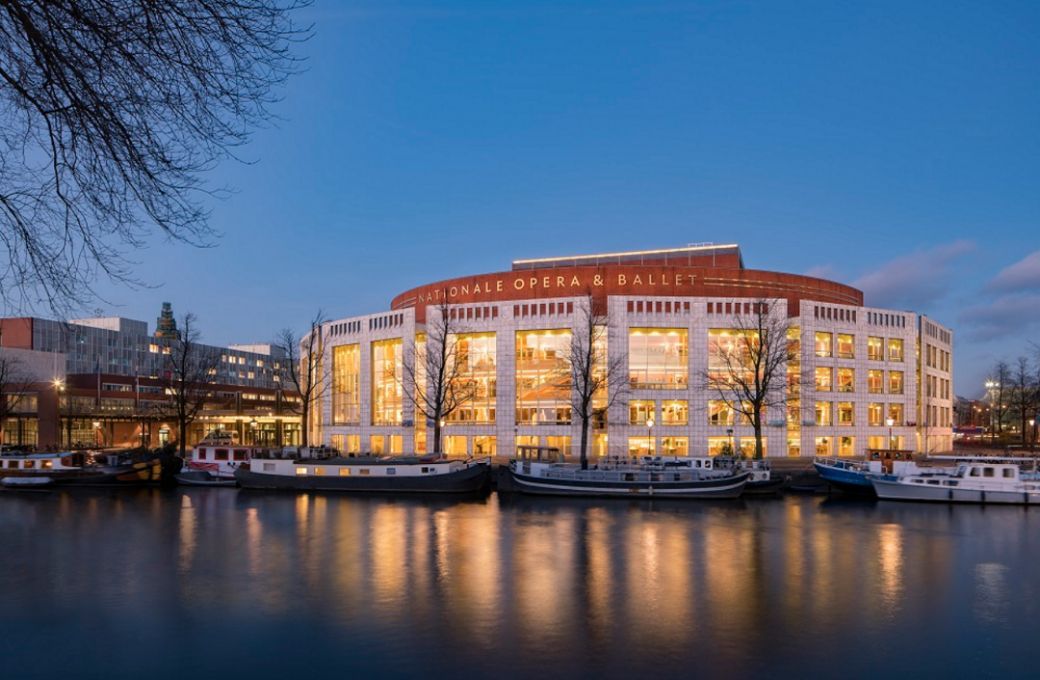Dutch National Opera & Ballet has to be one of the most innovative houses in Europe. Its opera and ballet seasons both feature a very high percentage of new productions, covering a broad range of repertoire from classic titles to world premieres, both at their Amsterdam base and out on tour across the Netherlands.

The opera season, devised by DNO director Sophie de Lint, sees the completion of a pair of trilogies. In April, the Donizetti “Tudor Trilogy” of the past three seasons concludes with Roberto Devereaux, the tale of Queen Elizabeth I and her love for Robert, the Earl of Essex, who awaits his trial, accused of high treason. Stage director Jetske Mijnssen and conductor Enrique Mazzola reunite, following their collaborations on Anna Bolena and Maria Stuarda. Uzbek soprano Barno Ismatullaeva makes her DNO debut singing the Tudor queen, while Ismael Jordi sings Roberto, once again taking the tenor lead in this challenging trilogy. Mazzola, a bel canto specialist, is sure to bring plenty of energy to the pit, where he conducts the Netherlands Chamber Orchestra.
A new staging of Il trittico is the third Puccini production in as many seasons to be directed by Barrie Kosky. The Australian director has already applied his magic touch to Tosca (a film noir psychological thriller) and Turandot (in which the title character remains unseen) and now turns his attention to the triptych of one-act operas Il tabarro (The Cloak), Suor Angelica and Gianni Schicchi. These three disparate works have been shackled together as Il trittico since their 1918 premiere at the Metropolitan Opera, New York. Some directors try to find common links, others treat them as separate entities. With Kosky, expect the unexpected.
Kosky makes an earlier appearance in the DNO season when his Agrippina production, already seen in Munich and London, makes its way to Amsterdam. Set as a House of Cards-style plot of political intrigue, with Agrippina scheming to manoeuvre her son, Nerone, into power. A starry new Handel cast assembles, led by French mezzo-soprano Stéphanie d’Oustrac, with John Holiday as Nerone and Ying Fang as Poppea. Ottavio Dantone directs his sparky Baroque ensemble, Accademia Bizantina.
To open the season, Ivo van Hove directs Kurt Weill and Bertolt Brecht’s Aufstieg und Fall der Stadt Mahagonny. Using green screens and live camera footage, his production turns the tale of the deceptive city of gold into a highly topical story. Lauren Michelle stars and Jenny and Straussian soprano Evelyn Herlitzius makes her role debut in the role of fraudster Leokadja Begbick. Markus Stenz conducts the Netherlands Philharmonic Orchestra.
DNO Chief Conductor Lorenzo Viotti conducts his first Wagner opera in November when Christof Loy directs the new production of Lohengrin, which is sure to be economically staged, but psychologically powerful. Stepping outside of his usual territory into Wagner, German tenor Daniel Behle tackles the title role. Malin Byström, who has previously sung Tosca and Salome for DNO, sings Elsa, with Thomas Johannes Mayer and Martina Serafin as Telramund and Ortrud.
Ukrainian director Andriy Zholdak digs deep into the layers of Beethoven’s only opera, Fidelio, via the means of visual imagery and symbolism reminiscent of film directors Andrei Tarkovsky and Ingmar Bergman. Inspired by events from the time of the French Revolution, tyranny and corruption are at the core of the opera, themes still relevant today. Jacquelyn Wagner sings the role of Leonore, who disguises herself as a man – Fidelio – to rescue her husband, political prisoner Florestan (Eric Cutler). Andrés Orozco-Estrada conducts the Royal Concertgebouw Orchestra in their annual appearance in the DNO pit.
New work continues to be a company focus. October sees the Dutch premiere of Kaija Saariaho’s latest opera, Innocence, a harrowing tale based on the sadly ever-topical theme of a school mass-shooting. Already seen at the Festival d’Aix-en-Provence and The Royal Opera, Simon Stone’s production is powerful and intense.
Another topical theme is at the centre of Ellen Reid’s new work, The Shell Trial. It addresses the climate crisis, based on the 2020 play De zaak Shell by Rebekka de Wit and Anoek Nuyens, which concerns a Dutch court ruling that oil giant Shell was legally responsible for its contribution to climate change. Gable Roelofsen directs a production which has been designed to be as environmentally sustainable as possible.
March sees the world premiere of a new work on the theme of crime and punishment by Samy Moussa. Antigone draws on Ancient Greek texts and is paired with Stravinsky’s Oedipus Rex. British choreographer Wayne McGregor, who has previously created new productions for Dutch National Ballet, directs this intriguing double bill.
There are several highlights to Dutch National Ballet’s season, including a production Giselle that hits the road after Amsterdam to play in six other Dutch cities. It’s good to see some recent productions returning, such as Rachel Beaujean’s 2022 take on Raymonda and Annabelle Lopez Ochoa’s Frida, which premiered in 2020, itself an expansion of her earlier work, Broken Wings. There are world premieres by DNB director Ted Brandsen (based on John Adams’ The Chairman Dances), Juanjo Arqués and Milena Sidorova. But perhaps the most anticipated DNB programme sees the return of Alexei Ratmansky to Amsterdam for a Stravinsky double bill of The Firebird and the European premiere of his version of The Fairy’s Kiss, set to Stravinsky’s delectable and affectionate homage to Tchaikovsky.
See all of our event listings for Dutch National Opera & Ballet.
This preview was sponsored by Dutch National Opera


